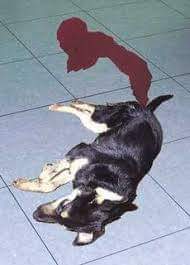CANINE PARVOVIRUS INFECTION: A LIFE THREATENING DISEASE OF DOGS
Dr. Santosh Giri
B.V.Sc & A.H.
Veterinary Officer
Ghazipur
Canine Parvovirus Infection is life threatening viral disease of the dogs. Canine Parvovirus (CPV) is seen mostly in dogs less than six months old. It is highly contagious viral disease that transferred from one dog to other. Most prominent signs and symptoms are severe vomiting, mucus or bloody diarrhea with foul smell, loss of appetite, weakness and lethargic. That leads to severe dehydration. Mortality rate is 16 to 35%.
How The Dogs Get This Virus:
This virus is highly resistant that can live in the environment for months and other objects like food utensils, clothes, carpets and floor of houses from feces of infected dogs. But most commonly unvaccinated dogs may come to contact parvo virus from streets like our country India where stray dogs are in abundance. Virus may be transferred from direct contact to infected dog or indirectly by fecal contamination. Infected dogs start to shed virus in their feces from third day after getting infection. Recovered dogs serve as a carrier and shed virus periodically in their feces. After ingestion of the virus, it multiplies in the oropharynx and then enters into the blood stream. It affects the dividing cells in the bone marrow causing neutropenia and also affects the epithelium of the jejunum and ileum that leads to bloody diarrhea. Normally incubation period is 3 to 8 days. In this time period animal does not show any clinical sign of the disease.
Which Dogs Are More Threatened to PARVO
Mostly unvaccinated puppies and young one dog, less than six month of age, are more threatened to parvo virus infection. Dog breeds like Rottweilers, Labrador retrievers, and German shepherds and Toy breeds are at high risk. Street dogs are also at risk to get parvo infection but survival chances are higher in them because of high immunity level than pet dogs.
Forms of Parvo Virus
There are two forms of parvo viral infection myocarditis and gastroenteritis. Myocarditis occurs in young ones and rarely seen. Gastroenteritis is the most common form that occurs at age of 6 to 12th week as the maternal antibodies of the young ones start to decrease. It is characterized by fever, anorexia, loose bloody diarrhea, vomiting and lethargy.
Parvo viral infection can be diagnosed by clinical signs and laboratory test.
Treatment. . .
There is no specific treatment for any viral disease only supportive therapy is given to boost up patient’s immune system and symptomatic treatment is given.
- In supportive therapy electrolytes, vitamins, minerals and ringers lactate solution are given in the form of i/v infusion to control the dehydration status. Dogs that survive 2 to 3 days may recover from the disease.
- For controlling vomiting metoclopramide is used at the dose rate of 0 .5 mg per kg body weight sub cut or oral and 1-2mg per kg slow i/v should be given.
- For fever antipyretics are used i.e meloxicame.
- Antibiotic therapy should be given to control secondary bacterial infection. Dogs with severe blood loss in diarrhea having bacteremia so treated with trimethoprim-sulph @ dose of 15mg/kg body weight s/c for 3- 5 days.
- Hyper-immune-serum can be used during disease which has good response. These are prepared antibodies that act as an armed army to fight against disease.
- Food and water should be with hold until vomiting.
- Boiled chicken should be offered when starts eating but in low quantity with intervals then normal feeding. Dog will come to its normal feeding 7-14days after recovery.
Prevention and Control
Outbreaks of parvo infection are difficult to control due to the resistance of the virus to regular cleaning methods and the ability for the virus to survive more than six months in the environment. Effective vaccination protocols are paramount in protecting dogs against infections and the spread of CPV.
Following schedule for parvo vaccine should be practiced.
Ø 1st shot 6th week of age
Ø 2nd shot 9th week of age
Ø 3rd shot 12th week of age
Ø Then repeat one shot annually.
Antibiotics used these days are cephalosporins + fluoroquinolones
To control gastritis, h2 blocker/ proton pump inhibitors as omeprazole or pantaprazole is used
Fluid therapy includes judicious use of crystalloids as well as colloids.
Early diagnosis of parvo through ELISA kit can be useful to start immunoglobulins therapy
Nasal vaccines for parvo Or puppy DP vaccine can be administered as early as 30 days
Bitches must be vaccinated against parvo before pregnancy so that puppies born are well equipped with maternal antibodies



